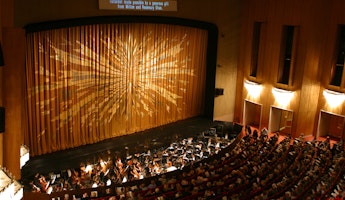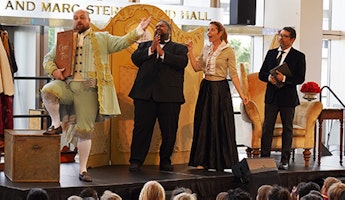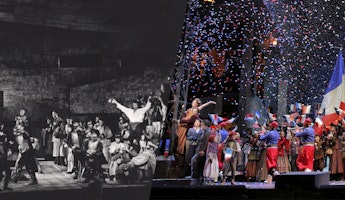Blog
February 22, 2022
The Three Women of Jerusalem Composer
Carla Lucero is breaking boundaries. The world premiere of her opera The Three Women of Jerusalem (Las Tres Mujeres de Jerusalén), LA Opera’s 2022 community opera production at the Cathedral of Our Lady of the Angels, will mark several firsts. It's the first opera by a female composer (she’s also the librettist) and the first Spanish-language opera to be commissioned for the Cathedral.
The family-friendly opera will premiere on March 19, 2022, with James Conlon conducting hundreds of amateur singers, dancers and instrumentalists of all ages, along with LA Opera’s professional soloists and musicians. Singers from around the world will also sing along (virtually) with the congregational hymns. These global performances will be shown inside the Cathedral, bringing everyone together.
The opera depicts the moment when Jesus pauses to comfort weeping women along the way to the crucifixion. (This event is commemorated in Roman Catholic services as the Eighth Station of the Cross.) Ultimately it’s all about hope and compassion. And it’s suitable for audiences of any faith (or none at all); its themes of compassion and community are universal. We asked the composer to talk about her new opera.
THE BIBLE ONLY HAS ONE SENTENCE ABOUT THESE WOMEN. HOW DID YOU FILL OUT THE STORY?
Yes, there is little information about them. They weep for Jesus when they witness His pain and understand, on some level, that there has been no crime committed that could justify such torture and humiliation. Jesus understands their weeping as an acknowledgement of their own human frailty. In essence, the tears they shed are tears of grief for the darker side of human nature, something that we all carry inside of ourselves to varying degrees.
I introduce the women at the beginning of the opera, as they shop in the marketplace. This gives the audience a bit of backstory on their individual characters. I also give them names. I don’t want to give too much away about the main characters, but let’s just say that they end up living up to these names: Sacrifice, Love and Purpose.
WHAT DO YOU HOPE THAT AUDIENCES WILL TAKE AWAY FROM THE OPERA?
I hope that audiences identify with the tests of faith and conscience that the three women in the opera face. In the end, following our conscience is having faith in the goodness within us and acting accordingly. This is a universal concept to me, and not specific to any religious belief. Through empathy comes tangible goodness and change for the better, if we put away our fears. The Passion can be uplifting and motivating. I really hope this comes through in The Three Women.
COULD YOU TALK A BIT ABOUT HAVING THE PIECE PERFORMED IN SPANISH?
It’s a passionate and beautiful language that I am proud to have as part of my heritage. I have written operas in both Spanish and English, and honestly, both languages work wonderfully when they are set to music. Spanish is softer on the tongue and on the ear with rich and round vowel sounds. Spanish is not my first language, so I enlisted the assistance of an amazing poet and translator, Dr. Rita Urquijo-Ruiz, who is also a theater artist. She translated my original libretto from English to Spanish very carefully, so that it would register culturally and poetically with the audience. I hope that the Spanish speaking communities of Los Angeles and beyond will accept this as a love letter from me to them.








/03-cosi/_dsc0996_pr.jpg?format=auto&fit=crop&w=345&h=200&auto=format)















